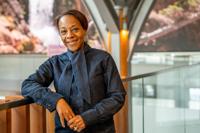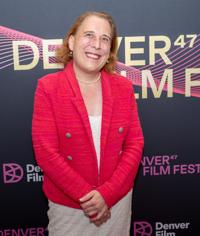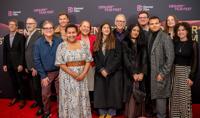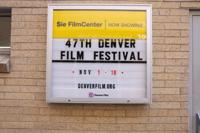The Denver Film Festival doesn’t aspire to a single overall theme each year. But this year’s centerpiece slate of films was a clarion call as loud as thundering echoes from the past:
Know your history. Learn from it. Keep it from happening again.
If only it were that easy.
An uncanny number of spotlight films at the 2024 festival were cautionary tales based on atrocities and inequities of the past, each seeming to remind us that our systemic societal problems have hardly gone away.
• Saturday’s closing-night film was “September 5” (releasing Nov. 29), which retells the story of the terrorist attack on Israeli Olympic team members that was orchestrated by affiliates of the Palestinian militant group Black September at the 1972 Summer Games in Munich. This screening comes just 13 months after the breakout of the Oct. 7 Hamas-Israeli war.
• Patricia Clarkson’s “Lilly” (opening 2025) immortalizes factory worker Lilly Ledbetter’s dogged, 30-year journey to achieve equal pay for women. And yet, today, working women earn 78 cents for every dollar men make, according to the Census Bureau.
• “The Order” (releasing Dec. 6) recounts the harrowing rise and fiery crash of just one Neo-Nazi supremacist group in the Pacific Northwest that assassinated Denver radio personality Alan Berg and sought the violent overthrow of the U.S. Government. In 2023, the Southern Poverty Law Center tracked 1,430 hate and antigovernment groups across the U.S.
• Even a 75th anniversary screening of the black-and-white classic “All the King’s Men” proved chillingly contemporary, as it shows the story of an ethical southern governor brought down by his own vanity, power and lust.
• The opening-night film was “The Piano Lesson” (in theaters now, streaming on Netflix Nov. 22), the story of a proud but subjugated Black family in 1936 – a period the late actor Harvy Blanks called “slavery in the era after slavery” when he performed the play in Denver. And while equal opportunity may be the bedrock of American democracy, Blacks and other minorities still face systemic barriers ranging from access to education, neighborhood quality, adult employment and wealth accumulation, as White House research lays bare, even in settings where there are no differences across groups other than race.
Several documentaries were informed by the recent repeal of women’s right to an abortion, which was presumed enshrined in 1973. And the zeitgeist documentary of the festival, “Half-Life of Memory: America’s Forgotten Atomic Bomb Factory,” called into question the safety of living near Rocky Flats west of Denver 32 years after it was shut down as a contaminated Superfund site.
“We are storytellers, and history informs the present,” Denver Film Artistic Director Matt Campbell said. “These are all stories that draw off historical lessons, and we are not learning them. A lot of these lessons have to be reinforced. Where we’ve been is going to inform where we’re going. And if our collective knowledge is erased, then we’re not going to learn, and we are not going to grow.”
Flynn’s word to the wise is chilling, and blunt: “The White nationalist movement, what it springs from and where it’s going, it’s still here today,” he said. “We just have to stay vigilant.”

Ben Chaplin is an English actor who rose to prominence in the 1998 comedy “The Truth About Cats and Dogs.” He She accepted one of Denver Film’s 2024 Excellence in Acting Awards on Nov. 9 at MCA Denver’s Holiday Theatre. He is currently appearing in “September 5.”
BEN CHAPLIN ON ‘SEPTEMBER 5’
The 1972 massacre of Israeli athletes at the 1972 Munich Olympics was a horror that played out with 900 million people watching on ABC. What was initially a triumph of journalistic ingenuity and necessity when Roone Arledge, Jim McKay and others deftly pivoted from covering sports to this enormously consequential unfolding news story turned into one of journalism’s darkest hours. ABC jumped the gun and reported to the world that all of the remaining hostages were safe, when all of them were dead.
“September 5” is a taut drama that tells the story entirely from the distanced vantage point of the ABC News team there (they thought) to cover 17 straight days of Olympic competition.
Ben Chaplin, in Denver to receive one of the festival’s two 2024 Excellence in Acting Awards on Saturday, plays ABC exec Marvin Bader. I asked Chaplin what lessons we are to take from all this 50 years later, when “the media,” long since deregulated, now essentially encompasses everything from agenda-driven corporations to anyone with followers on a social platform. After all, anyone with online followers delivers “the news” in their way. We all have distribution. Which means we are all “the media.”
“I think that’s the most important question that the film poses,” Chaplin said. “I’m not sure that’s the question the writers set out to answer, but that does become the most important question, doesn’t it? Particularly now – because we can’t put Pandora back in the box.
“I think it’s important we are aware that every time we shoot something, every time we cover any story, there are consequences. I hope this movie reminds the audience that they need to be aware of that every time they consume media.”

Joan Chen brought the 2024 Denver Film Festival to a close on Sunday with her acceptance of Denver Film’s Career Achievement Award and a screening of her current film, “Didi,” at he Sie FilmCenter.
JOAN CHEN ON A ROLL OF ROLES
At age 63, Joan Chen doesn’t think she’s necessarily too young to be receiving Denver Film’s 2024 Career Achievement Award. After all, the Hawai’i International Film Festival gave Chen the same acknowledgement way back in 2007. “I was like, oh, they think I’m done,” she said Sunday. (She’s kidding!)
“I am deeply honored. I take it as an encouragement for me to continue to make better films. And I think times have changed and opportunities for people who look like me are a lot better. I mean, just this year alone, I made three movies. I never had that opportunity in my younger days.”
One of those upcoming movies is a remake of “The Wedding Banquet.” And one castmate is Bowen Yang, who grew up in Aurora and has a Chinese mother.
“We only had a very brief moment on-screen together, but I love Bowen – and I was so shocked that he actually speaks pretty good Chinese,” Chen said. “I was so surprised.”
Chen is terribly proud of “Didi,” which played to a capacity crowd at the Sie FilmCenter on Sunday. Chen plays a pivotal supporting role as mother to an impressionable 13-year-old Taiwanese American boy having a formative coming-of-age California summer.
“It’s a film that’s very close and dear to me,” said Chen, who was born in Shanghai during China’s tumultuous Cultural Revolution. “I like the fact that she is not a matriarchal tiger mom. She’s often uncertain and caught in between trying to be the best mother to her children, and not being sure how. I am that immigrant mother who raised two American children and I, too, was often unsure.”
Chen is known globally for her work in “The Last Emperor” and “Twin Peaks,” but because she was receiving an award Sunday for a career that spans 100 films, I asked her to name two lesser-known titles fans should watch to get a fuller sense of her body of work.
“One is an Australian film that is extremely difficult to get in the U.S.,” she said, “and it has a title that’s not so easy to remember. It’s called ‘The Home Song Stories.’ I play the filmmaker’s mom. That actually won the Australian equivalent of the Oscar for Best Actress, but it is little-known. And another one is called ‘Saving Face,’” a 2004 rom-com. “I was always this tragic woman, and Alice gave me this opportunity to play in a comedy,” she said in a previous interview.

Marianne Jean-Baptiste is an English actress best known for her role in the 1996 film “Secrets & Lies.” She accepted one of Denver Film’s 2024 Excellence in Acting Awards on Nov. 9 at the Denver Botanic Gardens. She is currently appearing in “Hard Truths.”
JEAN-BAPTISTE ON ‘HARD TRUTHS’
Marianne Jean-Baptiste, star of “Hard Truths,” accepted the other Excellence in Acting Award at the Denver Botanic Gardens. Jean-Baptiste already has earned several nominations for her performance as Pansy, a tormented woman prone to raging tirades against anyone who looks her way.
The film reunited her with legendary director Mike Leigh, who directed Jean-Baptiste in “Secrets and Lies” back in 1996. So, after that gut-scraper … what’s next?
“I almost feel like I need to do something like ‘Pinocchio’ or ‘Cinderella’ – something that’s just so very different from ‘Hard Truths,’” Jean-Baptiste said with a laugh.
“The thing I’ve been hearing with this film is that when people leave it, they discuss it. They talk about it over dinner. They know these people. Being involved in something that moves people, that does not spell out every last detail for them and leaves them with questions – I hope to do more of that.”

Amy Schneider, who is the second-winningest champion in “Jeopardy” history, put her knowledge of film to work as a juror at the 2024 Denver Film Festival.
AMY SCHNEIDER, CHAMPION JUROR
Amy Schneider, second only to Ken Jennings in consecutive “Jeopardy” wins (74 to 40), served among the jurors who choose the festival’s category winners.
“Jeopardy” fans may remember when Schneider spoke on-air of her deep love for film and how she is a regular attender of the prestigious Toronto International Film Festival. That landed her an invitation to serve on the jury of NewFest, the 2024 New York LGBTQ+ Film Festival. Denver Film’s Matt Campbell was watching, too, and he extended her an invitation to come to Denver and help judge the documentaries. Two titles particularly struck her.
“One was ‘Mistress Dispeller,’” she said of a Chinese documentary about a company you can hire to break up your spouse’s affair. “We tend to think that the ways we see the world as Westerners are universal,” Schneider said, “and this film really put us into a different mindset.”
She then mentioned what I think was, hands down, the most spellbinding film of the festival. “Grand Theft Hamlet” is a brilliant documentary that shows how two British actors waiting out the pandemic managed to rally rando members of the online gaming community into fully staging an actual production of “Hamlet” entirely from within the online world of “Grand Theft Auto.”
“I’m a Shakespeare kid,” said Schneider. “And I loved it. I mean, that was incredible.”

Denver Film Artistic Director Matt Campbell celebrates with Jeremiah Daniels of Aurora on Sunday after “Color Book” was named the juried winner of the Denver Film Festival’s American Independent category. It’s a black-and-white film about a young African-American father with a young son who has Down syndrome. The jury called it “beautifully crafted and full of heart.”
JURIED AWARDS
Here are the juried award winners from the 47th Denver Film Festival, which ended on Sunday:
- Best Feature Film (Krzysztof Kieslowski Award): “The Seed of the Sacred Fig,” by Mohammad Rasoulof, from Iran, Germany and France. “A stunning look at resilience in the face of overwhelming political and personal turmoil.”
- Best Documentary (Maysles Brothers Award): “Mistress Dispeller,” Elizabeth Lo, from China. “For its insight into a fascinating subculture, and emphasis on the importance of community.”
- American Independent Award: “Color Book,” by David Fortune. “Gorgeous direction, stellar cinematography, out-of-this-world performances, and a narrative that is beautifully crafted and full of heart.”
- Grand Jury Short Film Award: “Tennis, Oranges,” by Sean Pecknold, from the U.S. “An inventive and enormously brave look at the universality of loneliness, using stop animation.”
- Student Live Action Short: “Bye Bye, Bowser,” directed by Jasmin Baumgartner, from Austria. “Endearing ambition and vivid portrait of this generation’s youth.”
- Student Animation Short: “Humanity,” directed by Tereza Kovandová, from the Czech Republic. “Delightfully, darkly humorous depiction of what can make anyone go over the edge.”
- Rare Pearl Award: “Emilia Perez,” directed by Jacques Audiard, from the U.S.
- Stan Brakhage Vision Award: Cecelia Condit
- Italian Filmmaker Award: Cristiana Dell’Anna, “Cabrini”
- Excellence in Acting: Marianne Jean-Baptiste, “Hard Truths,” and “Ben Chaplin, “September 5”
- John Cassavetes Award: Patricia Clarkson, “Lilly”
- Breakthrough Director: Nnamdi Asomugha, “The Knife”
- 5280 Award (honoring exceptional cinematic work and film collaboration): “Saturday Night,” accepted by Jason Reitman (writer and producer); Gil Kenan (writer); and actors Gabriel LaBelle and Cory Michael Smith
- CinemaQ LaBahn Ikon Film Award: Jesse Tyler Ferguson, “All That We Love” and “It’s Okay”
- Rising Star Award: Ryan Destiny, “The Fire Inside”
- Excellence in Directing: RaMell Ross, “Nickel Boys”
- Excellence in Writing: Virgil Williams and Malcolm Washington, “The Piano Lesson”
- Excellence in Songwriting and Composing: Andrew Wyatt, “The Last Showgirl”
- Career Achievement: Joan Chen, “Didi”
AUDIENCE AWARDS
To be announced.

These are the jurors who decided the category winners at the conclusion of the 2024 Denver Film Festival. Photographed on Nov. 9, 2024.
MORE PHOTOS




JOHN MOORE/DENVER GAZETTE





















